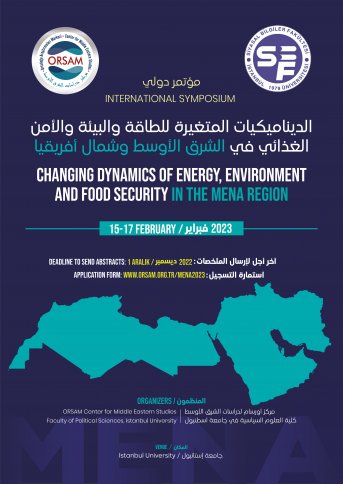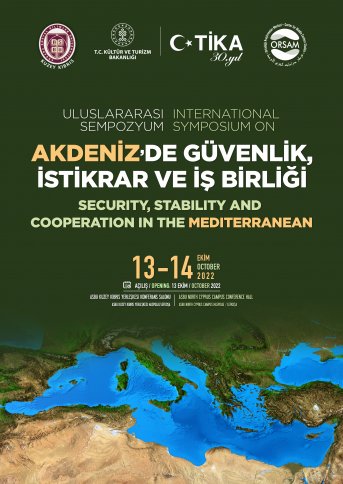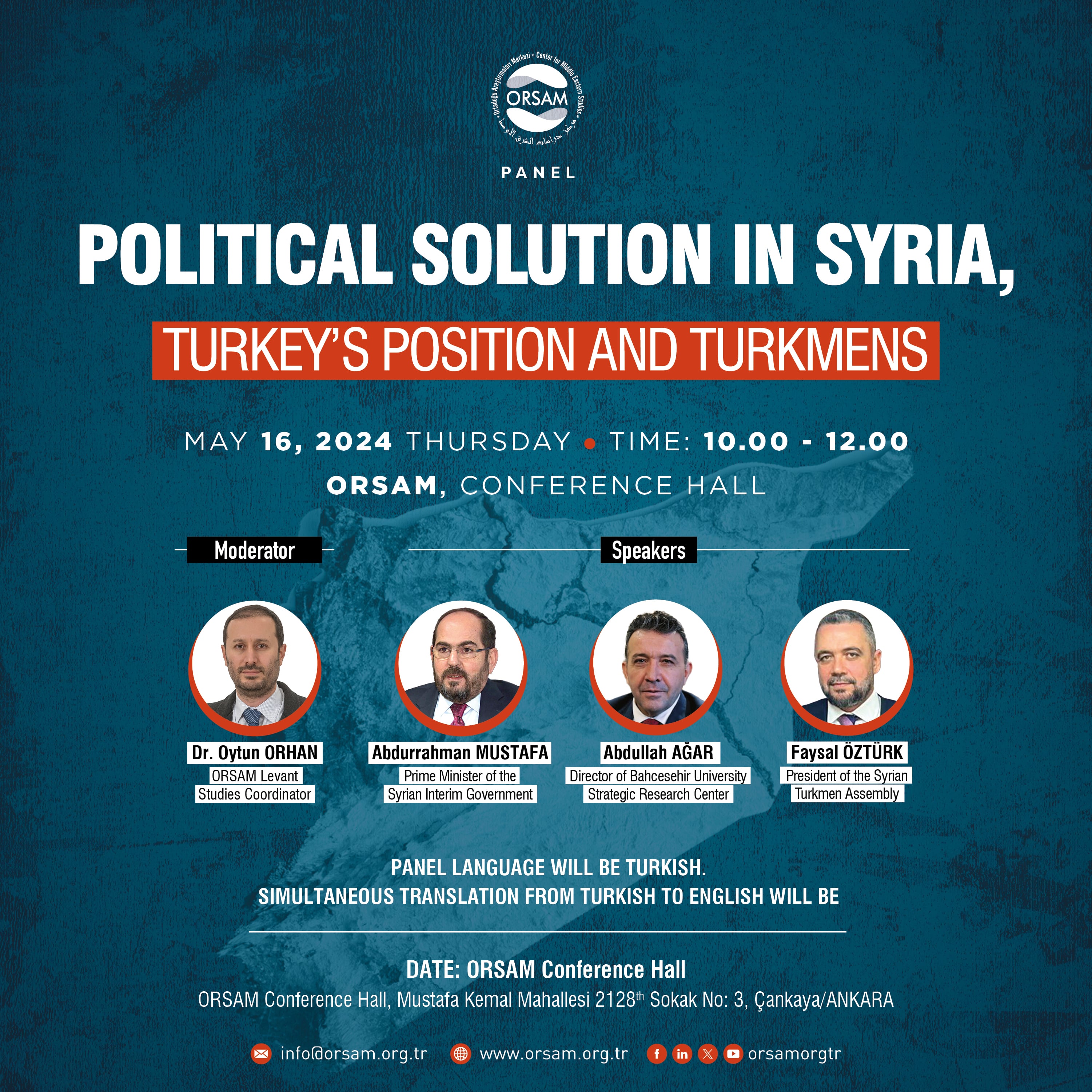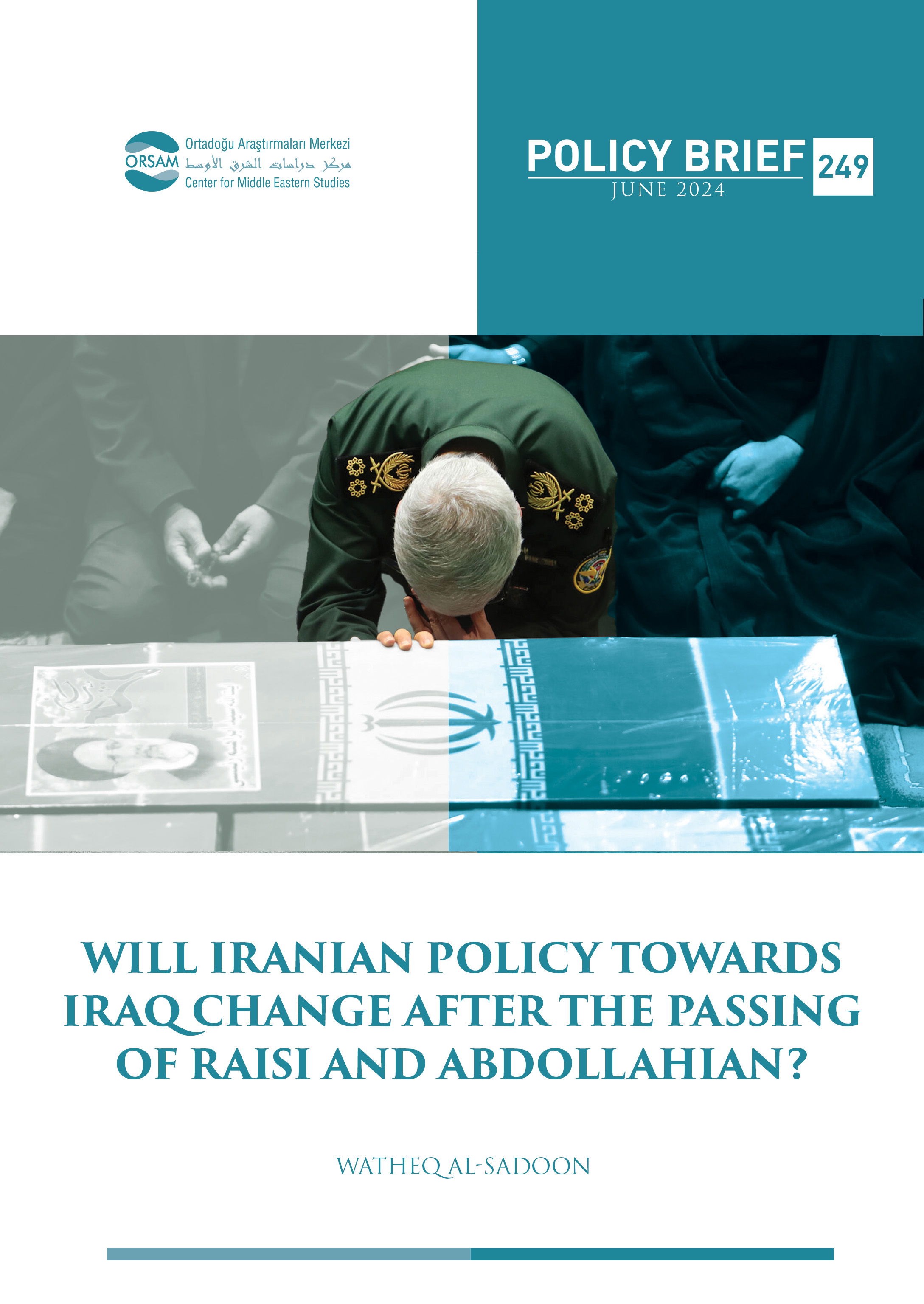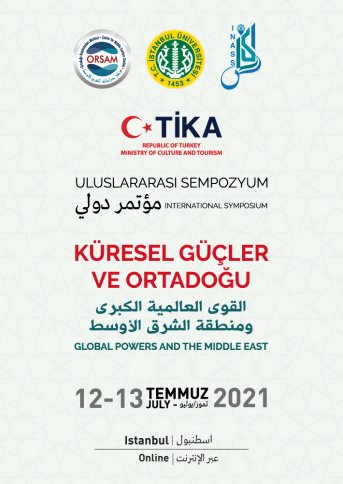
International Symposium: Global Powers and the Middle East
July 12-14, 2021 / Istanbul & Online
Research Question of the Symposium:
The Middle East has been at the center of Eurasian defense strategies for various great powers. The modern naval forces of the United Kingdom and the United States have been critically important in the international balance of power for countries involved in land-based geopolitics like the Soviet Union/Russia. Moreover, the Middle East represents an important global transportation crossroads, by land, sea, and air, linking three continents, Europe, Asia, and Africa, and containing straits and maritime routes, which are considered one of the most important gates of global trade. In addition, the Middle East owns the largest part of global oil reserves. These and other features have made this region strategically important in the accounts of the major global powers.
Since World War II, the Middle East has changed geopolitically in almost every decade. The current power dynamics in the region date back to the pre-World War I era. As the colonial legacy still plays an important role in the emerging state structure of the region, the Cold War period forced alignments based on different blocks. During the later period of the unipolar era, the US changed the old balance with interventions in the region, and thus a new balance could not emerge. Concrete examples of this are the First Gulf War between 1990 and 1991 and, later, the invasions of Afghanistan and Iraq and their failure in maintaining a sustainable order in these countries.
The Arab uprisings, or the ‘Arab Spring’, began in Tunisia on 17 December 2010 and spread to many countries such as Egypt, Libya, and Yemen, toppling many leaders. It disturbed the current security, economic, and strategic structures in the Middle East. In this period, the ‘Revisionist’ and ‘Status quoist’ rivalry transformed the region into chaos, leading to proxy wars. The conflicts and challenges in the region after the Arab Spring made the region’s relations with global powers more complicated and conducive. These complicated relationships among global powers, are concerned especially vis-à-vis Syria, Yemen, Iraq, and Libya. The situation has become fluid to the extent that the great powers sometimes compete and cooperate even on their agenda in a certain crisis.
It has become a challenge to analyze global powers’ (the US, China, Russia, Europe, and Emerging Global Powers) strategies on the Middle East in today’s changing international conjecture. While the Arab region is in chaos, the relations among global powers are fluid, and alliances are dynamic and flexible. In the current international system, the new balance which will most likely shape up in the Middle East will be different from the bipolar early-Cold War period and rival-proxy policies. The power vacuum in the region allowed regional actors more room to maneuver while terrorist organizations and other non-state actors have become more important, creating new questions about the nature of international relations in the Middle East.
Within this framework, it is essential to analyze the Middle East policies and strategies of the US, Russia, China, Europe, and the New Rising Global Powers and their bilateral relations with regional countries, and multi-dimensional relations and alliances. It is also necessary to understand the role of such powers’ relations, behaviors, and priorities. From this perspective, the international symposium organized by the Center for Middle Eastern Studies (ORSAM) and Istanbul University, in cooperation with the International Network for Arab Societies Studies (INASS), will serve to understand the dynamics of recent events and conflicts with global powers’ relations in the Arab world. This symposium also aims to shed light on the future of relations between global powers and the Middle East countries.
This symposium also opens the doors to discuss the relations between world powers and the Middle East countries within the framework of the transformations imposed by the COVID-19 pandemic. It also opens possibility for discussion about the prospects for the rise and fall of other global powers with the aim of predicting the features of the international system from a region perspective. This is especially so with an increasing possibility of economic, political and military competition between the US and China, as well as the changing roles of other powers such as Russia, and the UK, which left the European Union, and some emerging powers that demand more votes in the global system (Germany, Japan, and India). This forces the Middle Eastern countries to re-define their parameters towards international changes and spot the prospects for an international alliance with those powers.
Goals of the Symposium:
- To understand global powers’ policies (the US, China, Russia, Europe, New Rising Global Powers) toward the Middle East,
- To analyze how conflict dynamics in the Middle East are affected by global power rivalry,
- To analyze the nature of relations and alliances between global powers and the Middle East countries,
- To discuss the positions of the global powers towards terrorist organizations and non-state actors in the Middle East.
Themes of the Symposium:
Participants can talk about related topics, and some of the recommendations are:
- The historical background of Middle Eastern relations with the global powers.
- The policies of the global powers in the Middle East: US, China, Russia, and Europe.
- The Middle East and the new rising global powers (Germany, Japan, India).
- The competition of global powers in the Middle East.
- The rivalry between the US and Russia in the Middle East.
- The rivalry between the US and China in the Middle East.
- The relations of the global powers with the regional actors (list not exclusive):
|
|
|
|
|
|
|
|
|
|
|
|
|
|
|
|
- The positions of global powers and new rising global powers towards the issues, conflicts, and crises of the Middle East: (the Arab Spring, the Arab-Israeli conflict, the Syrian crisis, the conflict in Yemen, border disputes and separatism such as the Kurdish issue and the Western Sahara), etc.
- The positions of the global powers towards terrorist organizations deployed in the Middle East.
- The positions of the global powers towards non-state actors deployed in the Middle East.
- The Middle East, global powers, and new rising global powers, in the COVID-19 world.
- The cultural and social dimension in the relations of global powers and new rising global powers in the Middle East.
Terms of Participation:
The symposium welcomes all scholars and experts from social and human sciences. Regional experts, scholars, think tanks, research centers, media, decision-makers, and Ph.D. students can participate in related presentations and articles, provided they fulfill the points below:
- The writing language can be in English, Turkish, and Arabic.
- Presentations will be in Turkish, English, and Arabic.
- Texts will not exceed 7000 words.
- The abstract must be no more than 250 words; it should contain keywords and should be sent as a word file attached to the registration form to participate in the symposium.
- For Arabic abstracts, English translation of the abstract is also required in the same sent word file.
- In Arabic writing, headliner should be 16 font, sub-headlines 14 font, and the main text 12 font.
- The endnote system should be used.
- Articles must adhere to academic standards and should be original.
- For inquiries and correspondence, please contact: congress2021@orsam.org.tr
- Participation Fee: 75 USD (50 USD for Graduate Students).
Important Dates:
• Deadline to Send Abstracts: 15 April 2021
• Announcement of accepted abstracts: 25 April 2021
• Deadline for submitting the full texts: 5 June 2021
• Announcement of accepted full texts: 15 June 2021
• Sessions: 12-14 July 2020
Important: The symposium will be held both online and with physical presence in Istanbul if the COVID-19 pandemic measures allow. Otherwise, the symposium will be held solely online.
Symposium Administration:
- Honorary President: Prof. Dr. Mahmut Ak, President of Istanbul University
- President of Symposium: Prof. Dr. Ahmet Uysal, ORSAM Director & Istanbul University Professor
Organization Committee:
- Dr. İsmail Numan Telci, Sakarya University & ORSAM, Turkey (Coordinator)
- Dr. Watheq Al-Sadoon, ORSAM, Turkey/Iraq (Coordinator)
- Dr. İsmail Sarı, AHBV University & ORSAM, Turkey (Coordinator)
- Dr. Göktuğ Sönmez, NE Univ. & ORSAM, Turkey
- Dr. Recep Yorulmaz, AYB University & ORSAM, Turkey
- Dr. Samir Al-Abdullah, ORSAM, Turkey
- Mr. Bilgay Duman, ORSAM, Turkey
- Mr. Oytun Orhan, ORSAM, Turkey
- Mr. Gökhan Ereli, ORSAM, Turkey
- Ms. Nurbanu Akcan, ORSAM, Turkey
- Mr. Talha Özman, ORSAM, Turkey
- Mr. Cevdet Yavuz Öztürk, ORSAM, Turkey
- Mr. Adil Zineelabdin, ORSAM, Iraq
- Mr. Burç Eruygur, ORSAM, Turkey
- Ms. Dilruba Nur Dilmaç, ORSAM, Turkey
Advisory Committee (Alphabetic Order):
- Prof. Dr. Abdel Sattar Rejeb, Carthage University, Tunisia
- Prof. Dr. Abdullah Kızılcık, Istanbul University, Turkey
- Prof. Dr. Abdullah bin Muammar, Sana'a University, Yemen
- Prof. Dr. Ahmed Sami Marhoon Al-Maamouri, Al-Rafidain Center for Dialogue, Iraq
- Prof. Dr. Ayşegül Komşuoğlu, Istanbul University
- Prof. Dr. Birol Akgün, Ankara Yıldırım Beyazıt University, Turkey
- Prof. Dr. Cengiz Tomar, Ahmet Yesevi University, Kazakhstan
- Prof. Dr. Eman Shahin, Hamad bin Khalifa University, Qatar
- Prof. Dr. Enver Arpa, Advisor of ORSAM President, Turkey
- Prof. Dr. Faouzi Bendridi Ahmed, Souk Ahras University, Algeria
- Prof. Dr. Fawaz Al-Anezi, Kuwait University, Kuwait
- Prof. Dr. Haluk Alkan, Istanbul University, Turkey
- Prof. Dr. Ibtisam Muhammad Abdul-Amiri, University of Baghdad, Iraq
- Prof. Dr. İdris Bostan, Istanbul University, Turkey.
- Prof. Dr. Kemal İnat, Sakarya University, Turkey
- Prof. Dr. Majed Muhammed Al Ansari, Qatar University, Qatar
- Prof. Dr. Muhittin Ataman, University of Social Sciences, Turkey
- Prof. Dr. Muhsin Kar, Niğde Ömer Halis Demir University, Turkey
- Prof. Dr. Mustafa Abulgasim, University of Tripoli, Libya
- Prof. Dr. Namık Sinan Turan, Istanbul University, Turkey
- Prof. Dr. Necmettin Kızılkaya, Istanbul University, Turkey
- Prof. Dr. Nurşin Ateşoğlu Güney, Nişantaşı University, Turkey
- Prof. Dr. Rory Miller, Georgetown University, Qatar
- Prof. Dr. Talip Küçükcan, Marmara University, Turkey
- Prof. Dr. Sayım Yorgun, Istanbul University, Turkey
Scientific Committee (Alphabetic Order):
- Prof. Dr. Ahmet Öztürk, Istanbul University
- Prof. Dr. Hakan Berument, Bilkent University, Turkey
- Prof. Dr. Hasan Duran, Istanbul University, Turkey
- Prof. Dr. Mehmet Şahin, Police Academy, Turkey
- Prof. Dr. Nurcan Özgür Baklacioğlu, Istanbul University
- Prof. Dr. Özden Zeynep Oktav, İstanbul Medeniyet University, Turkey
- Prof. Dr. Özlem Tür, METU, Turkey
- Prof. Dr. Tayyar Arı, Uludağ University, Turkey
- Dr. Abdel Nasser Al-Jassem, University of Aleppo - University of Mardin, Syria
- Dr. Abdul Razzaq Khalaf Al-Taie, University of Mosul, Iraq
- Dr. Ahmet Köroğlu, Istanbul University, Turkey
- Dr. Al-Rashid Muhammad Ibrahim, University of Khartoum, Sudan
- Dr. Ali Hussain Bakir, Qatar University, Qatar
- Dr. Didi Ould Salek, President of the Mauritanian Center for Strategic Studies, Mauritania
- Dr. Ezgi Uzun, Sabancı University, Turkey
- Dr. Haider Ali Hussain, Mustansiriya University, Iraq
- Dr. Jamal Al-Shalabi, the Hashemite University, Jordan
- Dr. Khairy Omar, Sakarya University, Egypt
- Dr. Maryse Younes, Lebanese University, Lebanon
- Dr. Metin Ünver, Istanbul University, Turkey
- Dr. Mithaq Khairallah Jalloud, University of Mosul, Iraq
- Dr. Muhammad Najah Muhammad, University of Basra, Iraq
- Dr. Muharrem Hilmi Özev, Istanbul University & ORSAM, Turkey
- Dr. Murad Al-Abdullah, University of Basra, Iraq
- Dr. Robert Mason, Lancaster University, UK
- Dr. Talib Muhammad Karim, Al-Rafidain Center for Dialogue, Iraq
- Dr. Serhan Afacan, Marmara University, Turkey
- Dr. Süleyman Güder, Istanbul University, Turkey

